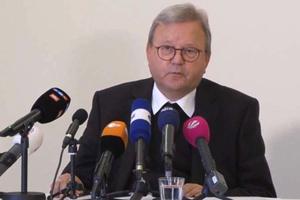German Bishop, Accused of Abuse, Found to Have Helped Wanted Pedophile Priests Escape to Latin America
The report lists 16 allegations and indications of sexual abuse against Bishop Stehle.

A German prelate who served as bishop in Ecuador is not only accused of having sexually abused minors in several countries. As director of a German aid organization he also helped pedophile priests wanted by authorities escape prosecution, according to an independent investigation published Monday.
The late Bishop Emil Stehle (1926-2017) — known in Latin America as Emilio Lorenzo Stehle — has been accused of sexual abuse in 16 cases, a statement by the German Bishops' Conference said on Aug. 8.
Furthermore, Bishop Stehle, the head of Adveniat, the Church in Germany‘s aid organization for Latin America, was found to have helped priests evade authorities by facilitating their escape to Latin American countries. The investigation found that he also provided the alleged perpetrators with financial support, using money from the German Bishops’ Conference.
Lawyer and mediator Bettina Janssen prepared the 148-page-report on behalf of the Association of German Dioceses, reported CNA Deutsch, CNA's German-language news partner.
The report lists 16 allegations and indications of sexual abuse against Bishop Stehle.
“The described offenses spanned his time as a priest in Bogotá (Colombia) [in the 1950s], as Adveniat managing director in Essen [1972-1984], and later as auxiliary bishop of Quito [1983-1986] and as bishop of Santo Domingo [1987-2002] in Ecuador,” the bishops' conference statement said.
Allegations against Bishop Stehle are not new. CNA Deutsch reported on abuse accusations against Bishop Stehle and his purported assistance in helping pedophile priests from Germany and other countries escape to Latin America in September 2021 and June 2022.
In addition to the abuse cases so far documented, the new report‘s author said there could be more. Janssen called for further “efforts, together with the relevant Latin American dioceses, to reach out to possible victims. To obtain a complete picture, investigators should further analyze to what extent Bishop Stehle’s abuses were known to church authorities — and what consequences they took against them.”
Bishop Stehle ensured that several priests accused of abuse could remain undercover in Latin America, the German Bishops' Conference said on Aug. 8.
The German bishops also said the investigation was ongoing. There would “not be a conclusion,” they noted; instead, there would be “consequences, the details of which still need to be clarified.”
Jesuit Father Martin Maier, the current chief executive of Adveniat, said, “We are grateful that this investigation has been carried out. It is part of the truth we must face as a church in Germany and worldwide. We owe that to the victims of sexualized violence and those who support our work.”
Adveniat was committed to a “position of absolutely zero tolerance towards the crime of sexual abuse” and stood “on the side of those affected in Germany and Latin America.”
Bishop Stehle died in 2017 at the age of 80, having spent his retirement years in Germany.
- Keywords:
- german bishops conference
















